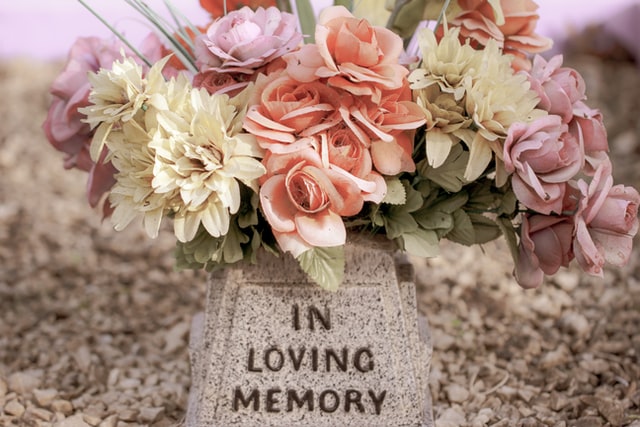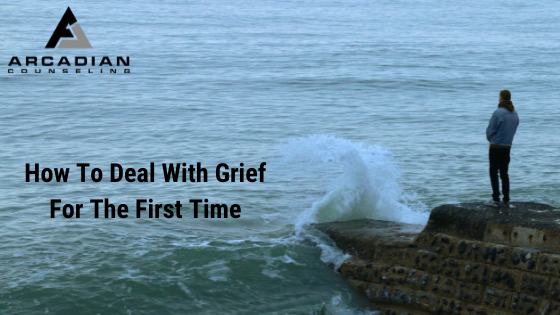One of the most devastating experiences we can endure in life is grieving the loss of a loved one. If you’re struggling with how to deal with grief for the first time, it can feel a bit like walking around in the dark blindfolded.
We know death is inevitable. Yet strangely, no amount of information can prepare us for the devastation of the actual experience. Losing someone we love for the first time can be overwhelming to say the least. Trying to comprehend the finality of this is a shock to our system. We might feel angry, anxious, depressed and a whole slew of other emotions.
The experience grief differs for each person. How we endure, experience, and eventually thrive is unique to each individual. Although the 5 stages of grief (denial, anger, bargaining, depression, and acceptance) are well known, they are still imperfect: not everyone will experience those exact emotions. There is no road map and no timeline when it comes to grief.
However, when you start to feel better is largely up to you.
The most important things to realize when it comes to grief, is the length of time you mourn or the depths of the pain you feel, are not a measure of how much you loved the person you lost. At the same time, it’s unwise to attempt to ignore the pain by attempting to bury yourself in work or play.
The only way past the pain, is through it – not around it or by ignoring it. So allow the feelings to come when they do. Cry if you need to cry. Laugh if you feel like you need to laugh. Be angry when you feel the anger. If the sorrow you’re experiencing is overwhelming, here are some strategies to manage grief for the first time.
4 Tips For How to Deal With Grief For The First Time
1. Schedule The pain

Wondering how to deal with grief for the first time? It can be helpful to schedule some time to “let out all the emotions.”
If you’re spending too much time feeling overly emotional, upset or crying – schedule a time for it instead. I know, it sounds a bit wild. But believe it or not it works wonders for people who struggle with worry and anxiety. There’s no reason it won’t work for grief.
Schedule a time for yourself (ideally when you can be alone and undisturbed) when you can cry (or just process and sort through the emotions if you’re not a cryer) as much as you like. When the time is up, freshen up and do something nice for yourself.
2. Do something in honor of Them

If you’re struggling with how to deal with grief for the first time then consider doing something in honor of your loved one like visiting their favorite place, cooking their favorite meal or donating to their favorite charity.
This can be making a donation in their name, volunteering, planting a tree, or baking their favorite cake. Maybe visiting a place you use to go together like the beach, a restaurant or even a park can be a way of honoring their memory.
3. Write It Out

If you’re struggling with how to deal with grief for the first time then consider writing a letter to your loved one. If can be a great way to process, unpack or simply unload your emotions.
Sometimes writing a letter can be quite cathartic and therapeutic. And, it can also be painful. But that isn’t a bad thing. In fact, that might even be a good thing because in order to get past the pain, you have to go through the pain. You have to allow yourself to feel all the emotions attached to your pain; good or bad. Because remember, all these difficult thoughts and feelings are attached to love. You can’t have them without the love you feel for the one you lost.
4. Meditate (no, not that kind)

Meditation is a great tool if you’re wondering how to deal with grief for the first time. It’s a great opportunity to connect with yourself and make sense of all the emotions you’re dealing with.
No, I’m not talking about trying to clear your mind of thoughts. Good luck with that! ????
Simply find a quiet place to sit with your thoughts and feelings. Be mindful to let them come as they will with an attitude of acceptance and curiosity. Don’t be afraid of the pain, the sadness or any anger that may arise. You are the like the sky and your thoughts and feelings are the like the weather – they come and go, but are never constant. Remember that.
4. Exercise

As with most things mental health, exercise is one of the best ways to deal with your emotions as it releases natural anti-depressants to give your mood a boost.
Go for a walk. Go to the gym. Take a yoga class. Try something new, or do something familiar – whatever feels good to you. Either way, exercise triggers a release of feel-good hormones that can help elevate your mood and help with your perspective and mindset. Doing so outdoors if the weather permits is even better as the sunshine and fresh air can do wonders for your soul as well.
When someone you loved has died, you are forever changed. Honor their memory by honoring their life, and honor their life by making the best of yours. If you’re trying to figure out how to deal with grief for the first time and need some guidance, find an awesome therapist you like and trust to help you unpack and process everything.
James Killian, LPC is the Principal Therapist & Owner of Arcadian Counseling in Greater New Haven, CT where they specialize in helping over-thinkers, high achievers, and perfectionists reduce stress, increase fulfillment and enhance performance so they can move From Surviving To Thriving.

